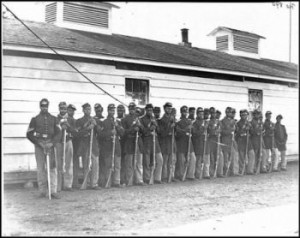Emancipation along the North Carolina coast began over a year ago when Union General Ambrose Burnside landed on Roanoke Island in February 1862. Soon, much of the coastal mainland was under United States control, and New Bern became Union headquarters for the region. From the landing of Ambrose to the present, African slaves have, in search of freedom and in growing numbers, fled from nearby plantations to Union controlled areas. Safe behind Union lines, thousands of former slaves in the ensuing months have worked for the federal army in building fortifications in New Bern and other coastal locales.
More recently, the January 1, 1863 enactment of U.S. President Abraham Lincoln‘s Emancipation Proclamation has paved the way for former slaves to bear arms in service of the Union. Massachusetts has led the way in this effort, with the organization, training and equipping of the 54th Massachusetts Regiment, a black infantry unit. Other black regiments also now exist, and some have seen battlefield action and fought admirably, dispelling widespread doubts (South and North) of African Americans’ fighting abilities.
This month the U.S. War Department authorizes Colonel Edward A. Wild, a Bostonian, to raise a brigade of African American troops in North Carolina. The African Brigade, as it becomes known, consists of three regiments: two from North Carolina and one Northern regiment, the 55th Massachusetts. As is the case with other black regiments, unit officers are white men.
The black North Carolina regiments comprising the Brigade are called the 1st, 2nd, and 3rd Regiments North Carolina Colored Volunteers (later they are renamed the 35th, 36th, and 37th United States Colored Troops).
There is no shortage of ex-slave volunteers for the two North Carolina regiments. Many enlistees are Christians, and of those, most are Baptists. As is the case with white Confederate soldiers, religious faith empowers ex-slaves now fighting for the Union. While many white Baptists of the South worship a God who ordained the enslavement of the African race, black Baptists uniformly worship a God who decrees freedom for all persons.
In 1864 the brigade disbands and the North Carolina black regiments are absorbed into other units. Near the end of the war, some of the original volunteers fight in the Battle of Fort Fisher. Altogether, by war’s end the three regiments formed this month represent a portion of the tens of thousands of ex-slaves who take up arms against the Confederacy, ensuring the defeat of the slaveholding nation.
Sources: Joe A. Mobley, “Civil War and Black North Carolinians” (link); Richard M. Reid, Freedom for Themselves: North Carolina’s Black Soldiers in the Civil War Era, University of North Carolina Press, 2008 (link)



